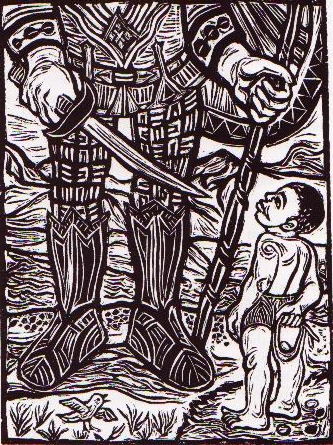
| "While serving as a missionary in Liberia in the 1920's, Lorenz Graham encountred startling retellsings of the stories of Jonah, Ruth, and other figures from the Bible. He discovered that the familiar tales had been transformed into a new literature when told in the idiom of West Africa. In 1946, Graham's exquisite renditions of these stories were published in How God Fix Jonah." |
A revised edition with two new stories was published in 2000, illustrated with blockprints created by Ashley Bryan (the one for this story is shown at the left). Lorenz closes his introduction with the following lead-in:
|
"Then read aloud and picture standing before you an African lad who has heard the old stories of gods and devlils and loud-spoken kings and fearless slaves. Her him say, Long time past Before them big tree live Before them big tree's papa live That time God live." |
I suspect we had the book long before I first encountered the David He No Fear story, but it was in Ashley's lively rendition of that story at one of the annual "Islesford Literary Evenings" after the book came out that first made me really aware of the book. David is just one of many delightful stories, but because it was "my first," it has stayed with me.
I approached the prospect of ever doing this in public with some trepidation -- a white man trying to do a piece in West African dialect, based on a number of cues Lorenz provides in his introduction. I talked with Ashley about it, and he categorically put that concern aside. To Ashley, the stories must live, and to live they must be given voice, and to him it is unacceptable to limit that voice only to the people who originated the story. So I've worked over this for a long time, and although my dialect is hardly West African, I give it my best shot.
Meanings -- Lorenz mentions various unfamiliar words and expressions in his introduction. In this story, the word palaver is not just "word", but connotes many words in discussions or the conducting of business, sometimes with an implication of trouble. Chop is food. To humbug someone is to bother him or her, and when your heart lay down, you are at peace.